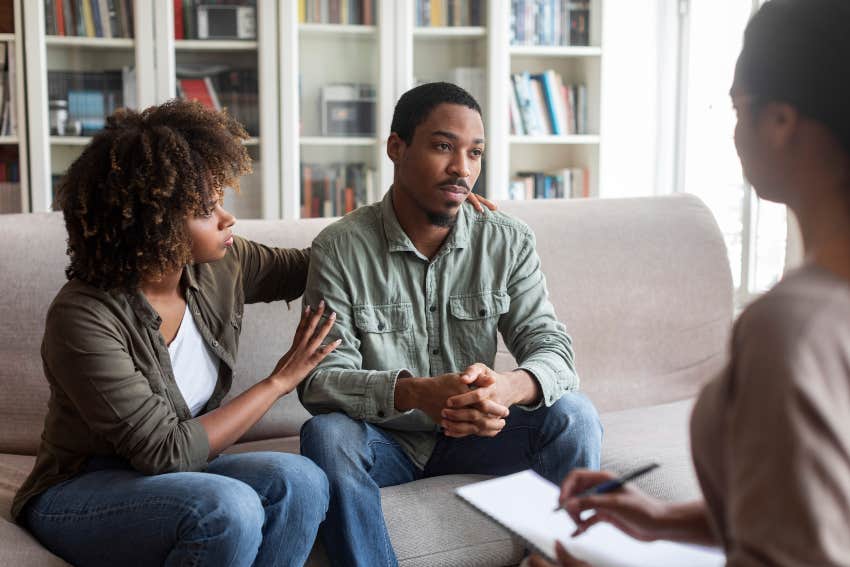Why Women Fall In Love With 'Nice Guys' With Bad Personality Traits, According To Psychology
Love can make someone turn a blind eye to negative behaviors.
 AntonioGuillem | Canva
AntonioGuillem | Canva You may think your boyfriend is one of the "nice guys", and you may even be right. After all, you wouldn't be dating him if not for all of the wonderful personality traits he's shown you, as well as the romantic way he talks with you about what's important to him in relationships. But beware: Nice guys aren't always what they seem.
That "nice guy" you're quickly falling in love with could be hiding a tendency toward bad habits ranging from things as minor as frequent lateness to more serious issues, like a history of cheating and domestic violence or abuse.
While it's true that no one is perfect, you must know the difference between what you can truly live with when it comes to your boyfriend's bad habits ... and what you cannot. Could you be “turning a blind eye” or “seeing through rose-colored glasses” when it comes to a man's negative personality traits?
Even if you overlook your boyfriend's bad behavior as it slowly emerges, it is still happening. Such unhealthy behavior will eventually affect you and your relationship if it goes unchecked or unaddressed for too long.
In relationships, we often choose someone who balances our qualities, like one couple I'll refer to as "Jane" and "Bob". In their marriage, Jane is responsible for the bills, but she never seems to meet the due dates and begins to rack up late fees. Bob resents her for the impact of the recurring late fees and their subsequently declining credit scores.
If Bob overlooks the negative impact of Jane's habit, which conflicts with his value system, for too long, the issue will eventually cause serious harm to their relationship. We often avoid addressing our partner's negative actions because we fear hurting their feelings or losing the relationship, even though their behavior doesn't align with our values. But it's important to remember that choosing to address problems proactively doesn't mean we are judging the other person, but that we are choosing to live our life according to our values.
Naturally, when we live with someone, we are affected by their set of values and they are affected by ours. Choosing to ignore such conflicts when they arise only builds walls of resentment. Of course, the negative behavior will likely continue if it is never brought to someone's attention, so eventually, the emotional health of the relationship can only decline.
 DimaBerlin / Shutterstock
DimaBerlin / Shutterstock
We often pick someone with the hope of changing them, but in reality, their core values and beliefs work for them, just as ours work for us.
Therefore, they do not need to change what has taken a lifetime to build. When you choose a partner you must accept all of their qualities and accept the probability that they will not significantly change.
We do what we want to do and we don’t do what we don’t want to do. That is why I always look at the results of everything. If something works for someone they are more likely to continue doing it. If it doesn't work for them, then they will choose to fix it or not. Either way, it is out of your control.
Make sure you truly see the person and how they function in their life. So, what can you do about your partner's bad habits?
- Approach your relationship without an agenda. Do not enter a relationship with an ulterior motive (i.e. wanting to be married by the time you turn 30).
- Have eyes that are open and willing to see. Don't come in with preconceived ideas.
- Develop skills and concepts that create a healthy relationship. They're essential to building a solid foundation.
- Take time to get it right. If you practice the three objectives above for at least 6 months, you will uncover the true nature of the person you are dating.
Talk to the person about the negative behaviors that make you feel uncomfortable or emotionally unsafe. It is not about judging the person but explaining how you feel and why you feel the way you do. Is he truly willing to work on these behaviors? You will know over time.
See if the person continues to work on those issues for at least six months consistently. It doesn't mean they need to be perfect, but both of you will need to continue your ongoing discussions regarding the conflict in your different values. As a result of these ongoing talks, you must determine if the issues are fixable and if the partner is truly willing to work on improving them.
Some behaviors or practices are more significant than others. Consistently failing to take out the trash is less significant than cheating or habitually lying. The latter behaviors reflect their values, which often do not change over time. It's up to you if you want to forgive a cheater, but the saying 'once a cheater always a cheater' might ring true, studies show.
 Prostock-studio / Shutterstock
Prostock-studio / Shutterstock
If you are truly invested in a relationship with a nice guy with bad personality traits, you may want to consider seeking professional guidance in couples counseling.
However, it takes both people to make it work. However, some habits and values are simply unacceptable when you're in a relationship or married to someone
Violence, being disrespectful to their partner mate, or others, breaking the law, and being habitually unfaithful (even in a past relationship) are all very serious signs of an unhealthy relationship. In addition, you cannot feel emotionally safe with someone whose actions do not match their words.
Your partner must consistently come through with their words and commitments. Think very carefully before committing to someone who practices any of these unacceptable and hurtful behaviors.
Hopefully, by now, it is clear why you can’t pick and choose those characteristics in someone you deeply care about. That’s why I recommend creating a "must-have" list before beginning a relationship. We all have qualities that we cherish and believe in. We also have those qualities that don’t work for us or do not help us to feel good about ourselves.
However, when choosing a partner, you need to distinguish between those things you can truly live with and those you cannot. When you choose a partner, you must take all of the people because those negative qualities and behaviors may never change.
What are some things to look for when choosing a partner? One study from Semnan University of Medical Science found that loyalty, commitment to ethics, personality traits, compatibility, and understanding are of top five priorities for choosing the right partner.
If you think you may be experiencing depression or anxiety as a result of ongoing emotional abuse, you are not alone. Domestic abuse can happen to anyone and is not a reflection of who you are or anything you've done wrong.
If you feel as though you may be in danger, there is support available 24/7/365 through the National Domestic Violence Hotline by calling 1-800-799-7233. If you’re unable to speak safely, text LOVEIS to 1-866-331-9474.
Susan Saint-Welch, LMFT, is a marriage and family psychotherapist who has been practicing in-person and online for over 20 years, helping radiant, single men and women get unstuck and find the lasting love they deserve.

